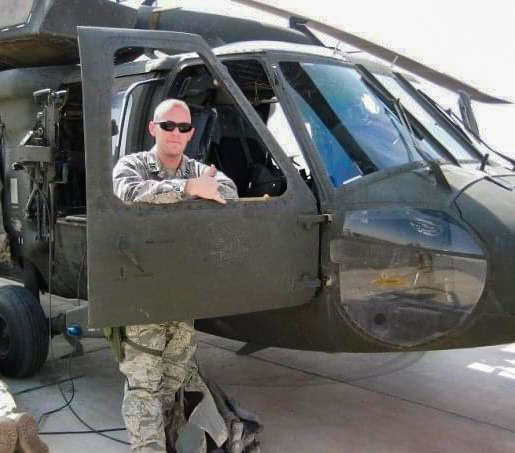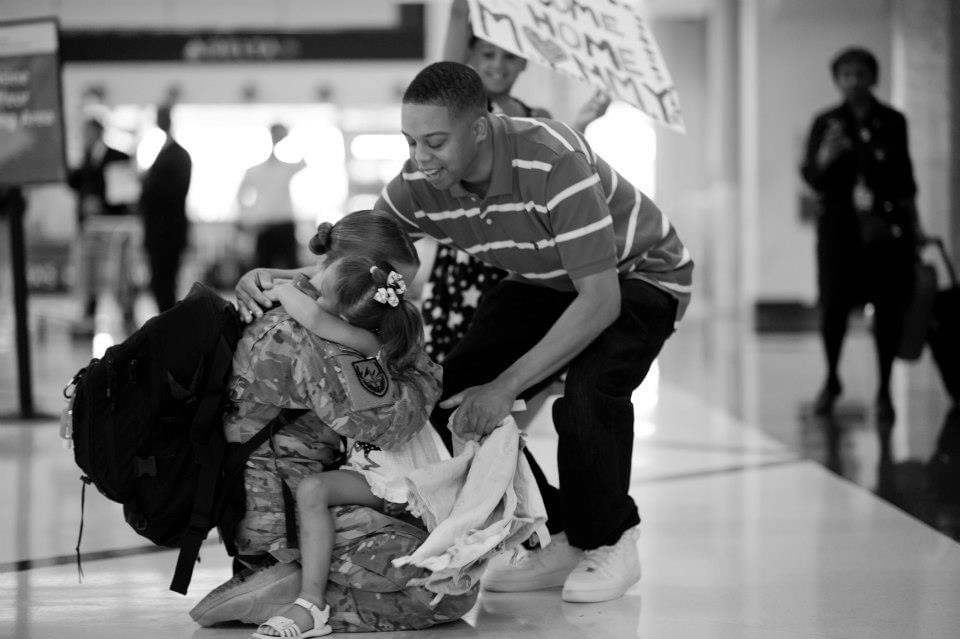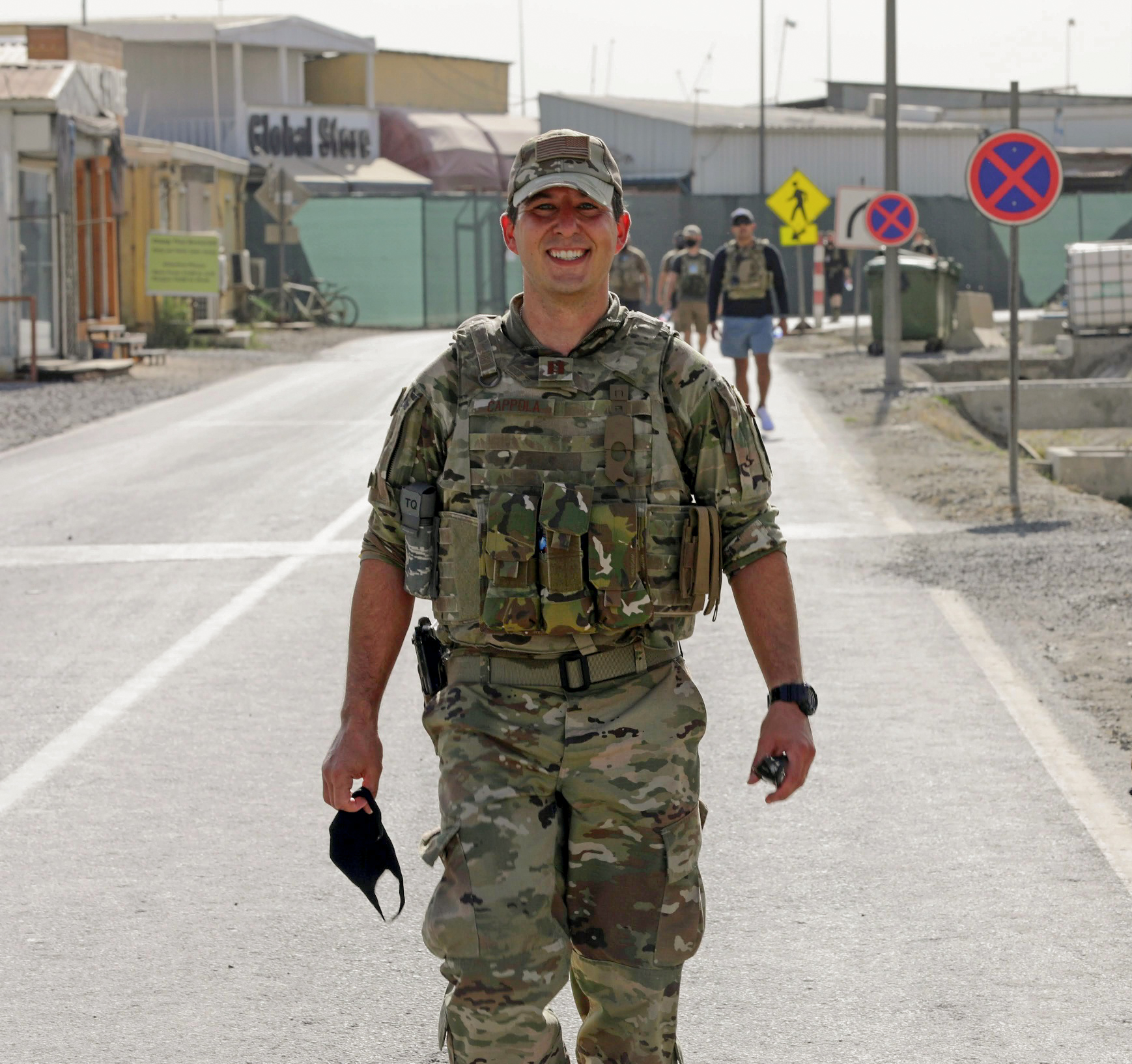Reflections on Deployment
As we come upon this Veterans Day, we remember the sacrifices of those who have gone before us in battle, and continue to learn from those who share their experiences.
Colonel D. Blake Williams
U.S. Army Staff Sergeant Keith M. Maupin deployed to Iraq in 2004 and was one of the first soldiers to be captured when his convoy was ambushed by insurgents. One week after his capture, Al Jazeera aired a video in which he appeared wearing camouflage and a desert hat, surrounded by five masked men holding rifles.[1] True to the bedrock commitment of never leaving our brothers and sisters in arms behind on the battlefield, a joint military team pursued the kidnappers of Sergeant Maupin for four years. In March 2008, his body was recovered from a field northwest of Baghdad.

Then-Captain D. Blake Williams in Kuwait, waiting for a helicopter across the Iraqi border to Camp Bucca for performing the mission to sit on detainee review boards. Photo provided by Colonel D. Blake Williams.
“I had a picture of Sergeant Maupin in my room, and I put it on the outside of my locker that I used as a closet and saw it every morning,” Colonel D. Blake Williams, 11th Air Force Staff Judge Advocate, Joint Base Elmendorf-Richardson, Alaska, recounted. Colonel Williams—then Captain Williams—deployed to Iraq in 2008, his first as an Air Force Judge Advocate. His duties on that deployment included detainee prosecutions. The photo hanging on then-Captain Williams’ locker was a constant reminder of the tireless efforts of the U.S.-Iraqi prosecution team and the Joint Personnel Recovery Center, to bring Sergeant Maupin home and to bring the insurgents responsible for his kidnapping and murder to justice.
Hugely impactful describes many deployment experiences from judge advocates and paralegals.
Captain Williams spent countless hours with his team, first investigating and then prosecuting this particular group of insurgents in accordance with Iraqi law. He also briefed Sergeant Maupin’s family on important updates in the case. Colonel Williams described the rule of law in Iraq as “a civilian judicial system that was more robust. Their judges were professionals and it was a functional judicial system” given the wartime conditions. “We were trying to bring them to justice in the Iraqi courts,” Colonel Williams said of the team of attorneys involved. “I was fortunate enough to be in country when they found his remains and identified them, and I was a part of the briefing to his parents.” Sergeant Maupin’s father had sworn he would grow a beard until his son was found. True to his word, he had a full beard the day Colonel Williams’ team briefed him that they had found his son.
Unfortunately, under the Iraqi court system, the insurgents were not found guilty of the murder charges, but they were found guilty of other terrorist acts. However, working within the rule of law in Iraq, Colonel Williams and his legal team secured a lengthy prison sentence, ensuring these insurgents would not harm again. “I’ll never forget that experience partly because he was one of the first people to go missing and had not been found. It was hugely impactful.” Hugely impactful describes many deployment experiences from judge advocates and paralegals.
Master Sergeant Devan Taylor
“I’m a huge advocate for doing things that people back home don’t get to do,” Master Sergeant Devan Taylor, a Technical Training Instructor at The Judge Advocate General’s School, Maxwell Air Force Base, Alabama. Master Sergeant Taylor deployed in 2012 to Bagram Airfield, Afghanistan, working as a detainee operations paralegal. “I served as a recorder for the detainee review board, presenting evidence and arguments as to why the person should be detained or released,” she recounted. It was the policy at the time to detain those present at the scene of an attack or those who appeared to be preparing for an attack. These detainees had the opportunity to have their cases reviewed by the board after six months so the board could determine whether there was sufficient evidence to warrant continued detention.
Typically, attorneys represent their clients at boards, but Sergeant Taylor broke the traditional role, raised her hand, and produced results—she set the record for serving on the most boards as a paralegal at the time in Afghanistan. In one instance, Master Sergeant Taylor was representing an elderly bread baker. His frail body sat with attention, keenly listening to every word that Sergeant Taylor was saying through the translator. His wife and daughter attended in solidarity, watching their loved one with bated breath. The board ruled that the grey-haired bread baker should be released. In that moment, the whole family cried tears of joy. “Big picture, you never know who will be involved in those groups. We are there to protect people and do it through the process,” Sergeant Taylor said.

Master Sergeant Devan Taylor is greeted by her family returning from her first deployment. Photo Credit: Operation: Love Reunited.
Master Sergeant Taylor had the opportunity to deploy again in 2018 to the 380th Air Expeditionary Wing, Al Dhafra Air Base, United Arab Emirates, as the legal office’s Non-Commissioned Officer In Charge. “We had a lot of people passing through,” she recounted. Her main role was serving operators in a legal assistance function, making appointments and powers of attorney. “It hits a little different in a deployed environment because we know those people are going to war,” she said.
Lieutenant Colonel Michael Raming
Lieutenant Colonel Michael Raming, Chief of Detention Law, Headquarters U.S. Southern Command, FL, confirmed Sergeant Taylor’s sentiments about Al Dhafra. He served as the Expeditionary Staff Judge Advocate, 380th Air Expeditionary Wing, from June 2020 to October 2020. Of Lieutenant Colonel Raming’s three deployments, his favorite was Al Dhafra due to the mission. He said:
It was the most Air Force out of all of them—we fight wars in the joint environment, but nobody has stayed in the Air Force and doesn’t love airplanes. It was in direct support to what you think you’re going to do: supporting an air expeditionary wing, supporting organizations that were flying the Air Tasking Order every day.
Lieutenant Colonel Raming saw the mission in action through his flights on two operational AWAC sorties and one EC-130 sortie at Al Dhafra. “It was all about supporting the people who had to go and fly a mission, and that was very rewarding,” said Lieutenant Colonel Raming.
Major Joseph Cappola
Deployments to the joint environment are rewarding experiences. “My deployment was one of the highlights of my Air Force career, personally and professionally, and it was giving 100% to our Afghan partners,” said Major Joseph Cappola, a Reserve Assistant Staff Judge Advocate for the 11th Wing Legal Office, Joint Base Anacostia-Bolling, D.C. Major Cappola, then-Captain Cappola, deployed to Hamid Karzai International Airport (HKIA), Afghanistan, as an Air Advisor from June 2020 to November 2020. He primarily advised the senior legal counsel for the Minister of the Interior for Afghanistan and the director of the Major Crimes Task Force, a special anti-corruption police unit.

Then-Captain Joseph Cappola, during the Installation-wide 9/11 Memorial Ruck March he organized at HKIA, Afghanistan. Photo provided by Major Joseph Cappola.
He worked closely with five Afghan translators, sharing tea, meals, and a safehouse between key leader meetings. Major Cappola recalled his friendship with Ahmad, one of his translators whose name has been changed to keep him safe. In October 2020, Major Cappola and Ahmad were chatting outside the safehouse in northern Kabul, where Ahmad voiced his concerns about the Taliban. As a self-professed artist, Ahmad had progressive ideas for Afghanistan, such as religious freedom for all, and it showed through his work and on his own body. He thought the Taliban wouldn’t approve of his tattoos or his photographs. Ahmad photographed when he wasn’t translating for the NATO mission, posting beautiful images on social media under a pseudonym. Ahmad feared for his family, his young son only three days younger than Major Cappola’s, if the Taliban were to advance in the country.
Unfortunately in August 2021, Ahmad’s deep fear became a nightmarish reality. Although Major Cappola had since redeployed back to the United States, he closely followed the fall of Afghanistan. Major Cappola remembered coming home to Washington D.C. after a weekend trip to Philadelphia, PA, listening intently to the radio on the car ride as the Taliban marched their way into the streets of Kabul. He was heartbroken for his friends who were still in Kabul. One of his translators had left the country earlier in June 2021, and settled in Sacramento, CA, but four of the translators, including Ahmad remained in Afghanistan. They were all eligible for the Special Immigrant Visa (SIV) program.
Major Cappola posted on social media a picture of himself and the five Afghan translators, asking for help. Help came in the form of an Excel spreadsheet. He found himself as an early member of what is now known as “Team America Relief,”[2] an organization that assembled real-time data to evacuate American citizens, U.S. lawful permanent residents (green card holders), and Afghans who were eligible for refugee status or the SIV program due to their work with the U.S. and NATO partners. “It was organizing a giant group of evacuees. By the end of the August, we had thousands of people in our database and my guys were numbers 16, 17, 18, and 19 on the list.” They worked tirelessly around the clock, creating near recognition signs and countersigns for people to use at the HKIA checkpoints and receive passage into the U.S. controlled area and flights out of the country.
The whole two weeks, I’ve never been more happy and more sad, ever. The highs and lows were so wild.
The only one I was personally able to get out was Hazrat,” said Major Cappola. Hazrat, whose name we also changed, was a young, mid-twenties newlywed when he was working with Major Cappola. Hazrat called Major Cappola at 0200, Eastern time. Major Cappola locked himself in the storage room in his house, trying not to wake his family. Hazrat had gotten to the main terminal, and was being challenged about his family’s evacuation, as they did not want to grant access to him or his wife. “My name is Captain Joseph Cappola, and this is my friend Hazrat. He is a legitimate SIV!” Major Cappola yelled into the phone. Desperate to help his friend, he shared a photo of himself with Hazrat to show to the U.S. guards. It worked, and Hazrat and his wife got through to safety.
It felt like an immense, terrible responsibility we had, and we were able to help some people, but not as many as we wanted to.
When recalling his August experience with Team America Relief, Major Cappola became emotional. “The whole two weeks, I’ve never been more happy and more sad, ever. The highs and lows were so wild.” He knew his friends and countless other Afghans placed their lives in the hands of his rapidly growing team of civilian volunteers and other organizations like it. “Our ethos at the time was, we have to keep knocking on doors and we just need one of them to open. Just one more, just get out one more.
Major Cappola said:
It felt so real that you had these people’s lives in your hand – those who were getting out alive, and those who couldn’t. It felt like an immense, terrible responsibility we had, and we were able to help some people, but not as many as we wanted to.
Major Cappola now knows four of the five have gotten out of Afghanistan safely. One remained due to a new marriage. And as for his friend, Ahmad, Maj Cappola kept in touch throughout the hard Afghanistan winter. He gave Ahmad realistic hope each time they chatted. Maj Cappola was overjoyed when recently, in October 2022, Ahmad texted, “Hello brother! I’m in Qatar."
Reflections
It is this bond of friendship that deployers come back to—the bond of being with the same people day in and day out. Colonel Williams said of his friends and coworkers from his two deployments:
You spend so much time with the people you deploy with—three meals a day, seven days a week, 15-16 hour days. You PT with them, celebrate holidays with them, it’s a family situation. You get in fights and annoy the hell out of each other, but you can’t walk away, you have to fix it because you spend so much time with them in a tight space where you live and work. That bond sticks with you.
Master Sergeant Taylor reflected:
You have lifelong friendships. No one else knew what was going on there. There’re not many other people who can take incomings and know what that means or what it was like when Bagram would get hit. You reflect on your experiences, the good, bad, and ugly, and it’s nice to have someone who was there with you.
A deployment is not a burden, a deployment is the reason we serve. It’s an opportunity to fulfill the service and oath we took.
This rings true not just in the deployed environment. “One of my favorite things about the military is the bonds you form, and the instant commonality when they see the coin, picture, something that reminds them of a common experience, and you have an instant bond,” said Colonel Williams.
Colonel Williams advises future deployers:
A deployment is not a burden, a deployment is the reason we serve. It’s an opportunity to fulfill the service and oath we took. Deploying to a combat zone, your life is in danger, there’s nothing glamorous or exciting, but it is an opportunity to challenge you and make you grow as a person. The people you meet can become lifelong friends and have a huge impact on your growth as an officer, attorney, paralegal, NCO, or person.
He acknowledged, “Everyone serves in their own way…my own reflections on service would be very different if I didn’t have my experiences from Afghanistan and Iraq."
I love sharing my opportunities with my daughter. When she was younger, I would tell her about a trip I went on, expressing a deployment was to help other people.
Sergeant Taylor smiled as she offered her advice:
No one ever wants to leave their family, right? We all sign up and know it’s going to happen. While it’s difficult, think of all the things you’re going to learn and take the opportunity to do good and learn the culture. It doesn’t matter what operation you’re working, you’re going to leave there better or with a different perspective on things.
I love sharing my opportunities with my daughter. When she was younger, I would tell her about a trip I went on, expressing a deployment was to help other people. I show her pictures of what we have done. It gives her a better appreciation as to why I left.
Veterans Day Remembrances
Veterans Day originated as Armistice Day, marking the end of World War I. As the holiday evolved in the United States, it now recognizes veterans of all wars. “For Veterans Day, it’s a way to appreciate and celebrate those Americans who were ok to take that sacrifice, where we have military members leave and do the mission,” Master Sergeant Taylor reflected.
For some, recognizing and honoring those veterans is a show of solidarity across nations. Colonel Williams recounted “When we were at NORAD, we were authorized to wear the red poppy on our uniforms in solidarity with our NATO partners.” For others, there are family ties to honor. “Both my dad and grandfather were drafted. I’m here because I want to be. That’s usually the big picture of what I’m thinking about,” Lieutenant Colonel Raming says of Veterans Day. Others look to being involved in their communities. “This will be my first Veterans Day as officially separated” off Regular Air Force orders, Major Cappola said. He continued:
I’m interested in learning what’s available in my local community …. I will use it as an opportunity to build a network in my new town and as a time to reflect back on the veterans in my family, and what the future might hold for future veterans and active duty brothers and sisters.
As we come upon this Veterans Day, we remember the sacrifices of those who have gone before us in battle, and continue to learn from those who share their experiences. Start the conversation: talk with a battle buddy, a friend or relative who has served, or someone in your office about their experiences. Our Corps has a wealth of knowledge and experience that we should honor and learn from.
About the Author

Major Allison K.W. Johnson, USAF
(B.A., University of Pittsburgh; J.D., George Mason University Antonin Scalia Law School; LL.M., The George Washington University School of Law) deployed to Headquarters Resolute Support, Kabul, Afghanistan from 2016-2017 and is currently an Instructor and Editor for The Air Force Judge Advocate General’s School at Maxwell Air Force Base, Alabama.
Edited by: Lieutenant Colonel Thomas Bittick, Major Laura Quaco, and Mr. Mark Stoup
Layout by: Thomasa Huffstutler
Endnotes